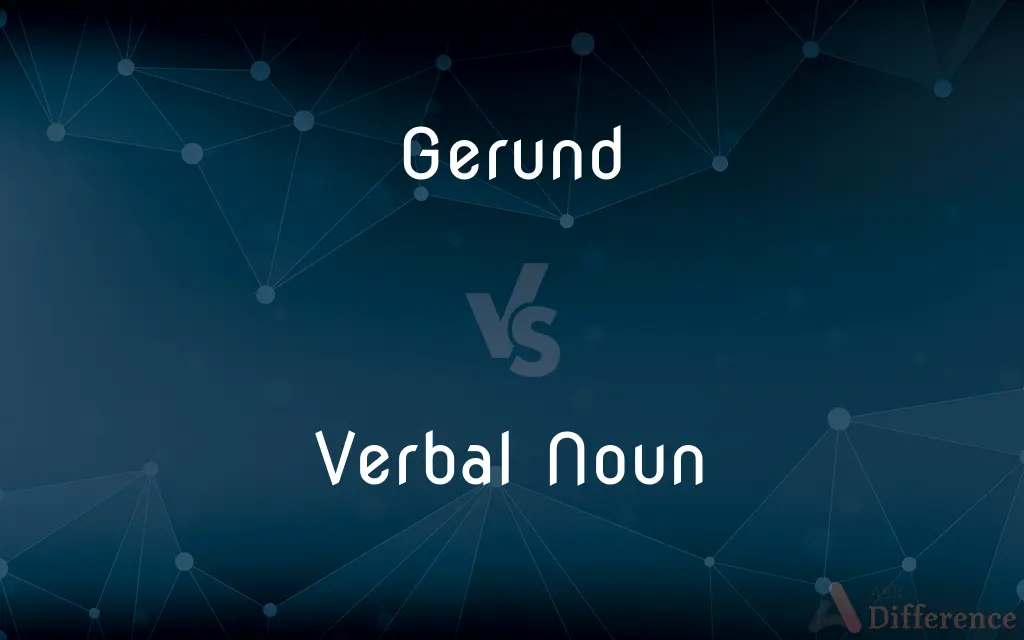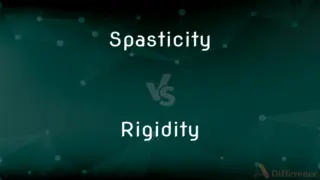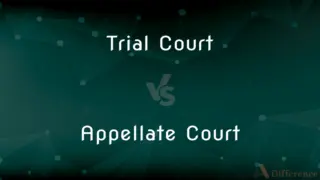Gerund vs. Verbal Noun — What's the Difference?
By Tayyaba Rehman — Published on October 25, 2023
Gerunds are verb forms ending in "-ing" used as nouns; Verbal Nouns are nouns derived from verbs but don't behave as verbs. Both play key roles in grammatical constructions.

Difference Between Gerund and Verbal Noun
Table of Contents
ADVERTISEMENT
Key Differences
Gerunds are unique in that they retain their verb-like properties, even though they function as nouns in sentences. For example, a Gerund can have an object, something that typical nouns cannot do. On the other hand, Verbal Nouns often resemble Gerunds but don't maintain their verb characteristics. They simply behave as nouns and cannot take direct objects like verbs.
Delving into their formation, Gerunds are consistently created by adding "-ing" to a verb. This makes their identification relatively straightforward. Conversely, Verbal Nouns can be formed in various ways, not just by adding "-ing." Some Verbal Nouns might look like Gerunds, but their formation can be more diverse.
A key difference lies in their modification. Gerunds, due to their verb nature, can be modified by adverbs. For instance, "quickly running" is a phrase where "running" is a Gerund modified by "quickly." In contrast, Verbal Nouns are purely noun forms and are typically modified by adjectives, not adverbs.
When considering their roles in sentences, Gerunds can be subjects, direct objects, or objects of prepositions. They keep some verb features, like being able to take on objects or be modified by adverbs. Verbal Nouns, despite originating from verbs, act purely as nouns. They don't retain verb-like characteristics and are integrated into sentences just as any other noun would be.
Comparison Chart
Formation
Always ends in "-ing"
Can be formed in various ways
ADVERTISEMENT
Function
Acts as a noun but retains verb properties
Behaves purely as a noun
Modification
Can be modified by adverbs
Modified by adjectives
Takes Direct Object
Yes
No
Example
"Running" in "Running is fun"
"Development" in "The development of the city"
Compare with Definitions
Gerund
A verb form ending in "-ing" used as a noun.
Swimming is a great exercise.
Verbal Noun
A noun that originates from a verb.
The growth of the company was rapid.
Gerund
Is derived from a verb but behaves differently.
She's interested in hiking.
Verbal Noun
Can be formed in different ways, not just "-ing."
The discovery of the artifact was significant.
Gerund
Retains some verb properties while functioning as a noun.
I enjoy reading books.
Verbal Noun
Can't take direct objects or be modified by adverbs.
The construction of the bridge took years.
Gerund
Can be modified by adverbs.
Quickly typing is essential for her job.
Verbal Noun
Doesn't retain verb-like properties.
The writing on the wall was clear.
Gerund
Can be the subject or object in a sentence.
Dancing gracefully is a skill.
Verbal Noun
Behaves purely as a noun in a sentence.
His arrival was unexpected.
Gerund
In Latin, a noun derived from a verb and having all case forms except the nominative.
Gerund
In other languages, a verbal noun analogous to the Latin gerund, such as the English form ending in -ing when used as a noun, as in singing in We admired the choir's singing. See Usage Note at fused participle.
Gerund
(grammar) A verbal form that functions as a verbal noun. (In English, a gerund has the same spelling as a present participle, but functions differently; however, this distinction may be ambiguous or unclear and so is no longer made in some modern texts such as A Comprehensive Grammar of the English Language and The Cambridge Grammar of the English Language)
Gerund
(grammar) In some languages such as Dutch, Italian or Russian, a verbal form similar to a present participle, but functioning as an adverb to form adverbial phrases or continuous tense. These constructions have various names besides gerund, depending on the language, such as conjunctive participles, active participles, adverbial participles, transgressives, etc.
Gerund
A kind of verbal noun, having only the four oblique cases of the singular number, and governing cases like a participle.
Gerund
A verbal noun ending in -e, preceded by to and usually denoting purpose or end; - called also the dative infinitive; as, "Ic hæbbe mete tô etanne" (I have meat to eat.) In Modern English the name has been applied to verbal or participal nouns in -ing denoting a transitive action; e. g., by throwing a stone.
Gerund
A noun formed from a verb (such as the `-ing' form of an English verb when used as a noun)
Common Curiosities
What's a Gerund?
A Gerund is a verb form ending in "-ing" used as a noun, like "running" in "Running is fun."
How is a Verbal Noun formed?
It can be formed in various ways, often from verbs, but doesn't always end in "-ing."
Is every word ending in "-ing" a Gerund?
No, some are Gerunds, but others might be Verbal Nouns or present participles.
Are Gerunds used in other languages?
Yes, many languages have Gerund forms, but their usage may differ from English.
What's the main function of a Gerund in a sentence?
It serves as a noun but retains some verb-like characteristics.
Can a Verbal Noun be pluralized?
Yes, since it behaves as a noun. For instance, "trainings" from "training."
How is a Verbal Noun different from a noun?
A Verbal Noun is derived from a verb, whereas regular nouns aren't necessarily derived from verbs.
Can you modify a Gerund with an adverb?
Yes, like "quickly running."
Can a Gerund take a direct object?
Yes, because it retains some verb properties. For instance, "I love reading books."
Can a Verbal Noun take a direct object?
No, it behaves purely as a noun.
Can a Gerund and a Verbal Noun look the same?
Yes, like "building" in "Building is hard" (Gerund) vs. "a tall building" (Verbal Noun).
Why are Gerunds called "verb-nouns"?
Because they have properties of both verbs and nouns.
Is "writing" in "Writing is essential" a Gerund or a Verbal Noun?
It's a Gerund, as it's derived from the verb "write" and functions as a noun in this context.
Is "development" in "the development of a plan" a Gerund or Verbal Noun?
It's a Verbal Noun.
How can you distinguish between a Gerund and a Verbal Noun?
Context and function in the sentence are key. If it retains verb-like properties, it's likely a Gerund.
Share Your Discovery

Previous Comparison
Benzene vs. Benzoate
Next Comparison
Spasticity vs. RigidityAuthor Spotlight
Written by
Tayyaba RehmanTayyaba Rehman is a distinguished writer, currently serving as a primary contributor to askdifference.com. As a researcher in semantics and etymology, Tayyaba's passion for the complexity of languages and their distinctions has found a perfect home on the platform. Tayyaba delves into the intricacies of language, distinguishing between commonly confused words and phrases, thereby providing clarity for readers worldwide.















































